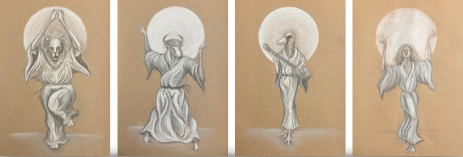Ordinary.
Once upon a time the cool of the day was for catching up in the Garden with the One who is both Dad and Mum in the truest sense. Gossiping the detail of each ordinary moment. Stuff to catch up on. The kind of friendship that forms over stories exchanged and steps clocked, weaving through the trees.
I wonder what the trees thought as they reached around and over betrayal and tearing. As their leaves were borrowed for shame-covering and hiding, and they rustled unseen through the subsequent days of quietness.
I was wondering at this whilst waiting in the van in the launderette carpark. My thought ribbon that day began as a weedy tree leant into the van window and began to tap-tap against it as it was directed by the soft breeze.
Watching this feeble dance, I thought how brave this single tree, remaining though surrounded by dust, tarmac, chain-link fences and so many vehicles.
I guess the trees have learnt the joy of remaining through all our stories. Providing shelter and a steady watching as we fumble through our days.
The tap-tapping weedy tree on this day was percussion behind Jon’s folk-picking guitar noodling as we waited for our washing. The orchestra expanded when Stanley from Trinidad appeared and leant against the open van-door. He was a long-time Bradford octogenarian, and a weaver of stories. The kettle was on. It’s always on.
Leaning his walking sicks against the van door, Stanley whipped a harmonica out of his leather man-bag and started to play “O when the saints” with vigour over Jon’s folk-picking. 40 minutes and a shared brew later, we’d heard about his adventures with Hendrix in Italy, and his dreams of leaving the city. He showed us his plans for converting an army truck into a camper-van. On its completion, he explained, he would raise two orphaned lion cubs who would then live in the van with him, providing company and protection. Setting his mug down, he treated us to one last mournful harmonica rendition of “Summertime…” , then wandered off with his sticks to catch a bus. Anywhere.
As Leonard Cohen wrote, Magic loves the hungry*
The tree continued to provide its percussion in the lull after Stanley left. Maybe not so feeble after all.
I’m not from a liturgical faith background, so until recently hadn’t crossed paths with the idea of Ordinary days. As I understand it now, Ordinary days populate the weeks between Epiphany and Easter, and Pentecost and Advent. I liked the phrase Ordinary time. My body feels it as an exhale: Ordinary.
Breathe.
Even when the ordinary Eden days of cool evening chats had become story-memories there were stories that took place under trees.
Ordinary and extra-ordinary.
Abraham baking bread to feed Jesus-before-Jesus, the Angel of the Lord.
Nathaniel, sitting invisible with his thoughts, but seen by heaven.
An Angel feeding a deeply miserable Elijah.
Zacchaeus ascending the knotty branches hoping to catch a glimpse of liberation in human form as it passed by.
Oaks, fig-trees, junipers, Sycamores, to name a few, were the rhythm section underpinning ordinary days exactly as they were in Eden. Trees hosted and covered holy moments, where heaven leant in to kiss, to converse, to listen. Ordinary days.
As ordinary as dreaming about raising lion-cubs for company on your desert journey.
As ordinary as waiting for laundry to dry.
As ordinary as waking to the memory that the cool of the day is still for walking and catching up with the One who dreamt you into being. Dad, Mum, Counsellor, friend.
I have a feeling that the trees never forgot. I have a feeling that if I pay attention they are still trying to awaken in us that first memory, nestled in our DNA, a hunger and a longing for fellowship in the cool of the day. Everyday.
*Leonard Cohen
